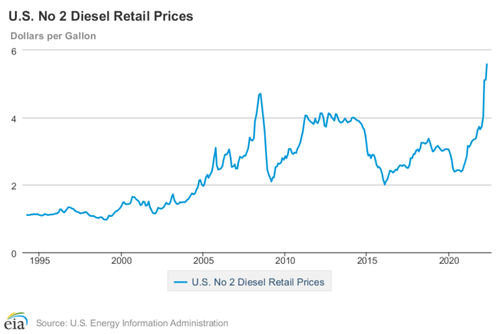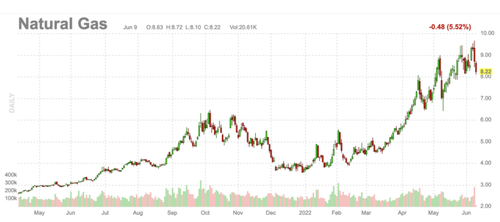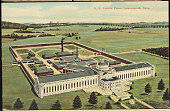Why Food Inflation Is Only Getting Started
Jun 21, 2022 10:48:02 #
Take a look at this:

The US has just experienced an 8.8 percent increase in food prices. The problem (and there are many, actually) is that this doesn’t take into account the spiraling costs farmers are now experiencing.
It’s worth remembering that because farmers pay upfront and only rec**p their expenses at the point of sale/harvest months later, all the increased costs they’ve experienced has a lag.
This lag is dependent on produce but certainly, we’re looking at a tsunami of food inflation 12 to 18 months out.
A farmer I know recently told me that he normally buys fertilizer in the fall after harvest. He said that his fertilizer costs doubled last year. That and his normal source for fertilizer has stated that there is not any available fertilizer available at this point with a good possibility of not having any this fall.
Then besides fertilizer, there is the fuel. Fuel and fertilizer together are the two largest input costs to farmers, typically exceeding in aggregate 50% of their total costs.
Here’s diesel:

Then we have fertilizer, itself a by-product of natural gas:

Fertilizer has tripled this year, and in some cases quadrupled. What are governments doing to “fix” this? Playing with interest rates. How cute!
Sticking with supply-side economics…
New Zealand to price sheep and cow burps to cut greenhouse gases
There is no question that we need to cut the amount of methane we are putting into the atmosphere, and an effective emissions pricing system for agriculture will play a key part in how we achieve that,” said James Shaw, c*****e c****e minister.
James, dear boy, you are either a complete abject moron or you are too cowardly to tell your handlers to go chew on thorns.
I won’t bore you with the details. It’s a tax. Surprise! A tax is administered to the most productive sector of the New Zealand economy.
When New Zealand can’t export the volumes of food it does, then it will quickly experience a widening trade deficit, weakening currency, and an explosion in the price of anything not domestically produced, which includes the coal it now imports (after shutting down natural gas facilities), diesel (which its farmers all use), and fertilizer (again, which its farmers use).
Quickly, New Zealand becomes less competitive on the global agricultural market. It’s just what’s going to happen. This isn’t some hypothetical situation. This is what happens. Watch!
What else?
If you price people out of the necessities of life, two things happen:
• They become desperate, and
• In desperation, they are susceptible and malleable to “solutions” which would have previously been out of the question.
When the World Economic Forum talks about eating bugs, they aren’t merely suggesting it in the sense that a company marketing a new product would. No. They are telling you.
There will be no choice since via a combination of supply destruction as New Zealand is showing, leading to higher costs and thus pricing more and more people out of the market so they can blame the price increases on the greedy farmers who are k*****g mother earth.
Think it makes no sense?
It doesn’t have to make any sense. What we learned over the last two years is that a never-ending stream of propaganda will lead the masses to demonize and ostracize those they are told to.
This time it isn’t 'the unv******ted', though that will not go away. It is farmers. How dare they provide us with food?
And so, it goes. Energy will be demonized. Just like it currently is in the U.S. And hence the UK’s most recent 25 percent “windfall tax” on energy firms in the UK amidst the worst energy crisis of our lifetimes.

The US has just experienced an 8.8 percent increase in food prices. The problem (and there are many, actually) is that this doesn’t take into account the spiraling costs farmers are now experiencing.
It’s worth remembering that because farmers pay upfront and only rec**p their expenses at the point of sale/harvest months later, all the increased costs they’ve experienced has a lag.
This lag is dependent on produce but certainly, we’re looking at a tsunami of food inflation 12 to 18 months out.
A farmer I know recently told me that he normally buys fertilizer in the fall after harvest. He said that his fertilizer costs doubled last year. That and his normal source for fertilizer has stated that there is not any available fertilizer available at this point with a good possibility of not having any this fall.
Then besides fertilizer, there is the fuel. Fuel and fertilizer together are the two largest input costs to farmers, typically exceeding in aggregate 50% of their total costs.
Here’s diesel:

Then we have fertilizer, itself a by-product of natural gas:

Fertilizer has tripled this year, and in some cases quadrupled. What are governments doing to “fix” this? Playing with interest rates. How cute!
Sticking with supply-side economics…
New Zealand to price sheep and cow burps to cut greenhouse gases
There is no question that we need to cut the amount of methane we are putting into the atmosphere, and an effective emissions pricing system for agriculture will play a key part in how we achieve that,” said James Shaw, c*****e c****e minister.
James, dear boy, you are either a complete abject moron or you are too cowardly to tell your handlers to go chew on thorns.
I won’t bore you with the details. It’s a tax. Surprise! A tax is administered to the most productive sector of the New Zealand economy.
When New Zealand can’t export the volumes of food it does, then it will quickly experience a widening trade deficit, weakening currency, and an explosion in the price of anything not domestically produced, which includes the coal it now imports (after shutting down natural gas facilities), diesel (which its farmers all use), and fertilizer (again, which its farmers use).
Quickly, New Zealand becomes less competitive on the global agricultural market. It’s just what’s going to happen. This isn’t some hypothetical situation. This is what happens. Watch!
What else?
If you price people out of the necessities of life, two things happen:
• They become desperate, and
• In desperation, they are susceptible and malleable to “solutions” which would have previously been out of the question.
When the World Economic Forum talks about eating bugs, they aren’t merely suggesting it in the sense that a company marketing a new product would. No. They are telling you.
There will be no choice since via a combination of supply destruction as New Zealand is showing, leading to higher costs and thus pricing more and more people out of the market so they can blame the price increases on the greedy farmers who are k*****g mother earth.
Think it makes no sense?
It doesn’t have to make any sense. What we learned over the last two years is that a never-ending stream of propaganda will lead the masses to demonize and ostracize those they are told to.
This time it isn’t 'the unv******ted', though that will not go away. It is farmers. How dare they provide us with food?
And so, it goes. Energy will be demonized. Just like it currently is in the U.S. And hence the UK’s most recent 25 percent “windfall tax” on energy firms in the UK amidst the worst energy crisis of our lifetimes.
Jun 21, 2022 11:06:13 #
Parky60 wrote:
Take a look at this: br br img https://assets.ze... (show quote)
Are we now capitalizing on food ?
Less availability means higher prices and higher profits.
Is this full blown Un regulated capitalism ?
Weaponized food.
Works with oil , right ?
And real estate ,
and now used cars ,
And advantage healthcare,
We still love capitalism , right ?
Even Un Regulated Capitalism ?
Close half of everything down and raise the prices.
A win win . Less effort for more money and less product.
Hard to beat good capitalism.
Jun 21, 2022 11:09:52 #
Milosia2 wrote:
Are we now capitalizing on food ?
Less availability means higher prices and higher profits.
Is this full blown Un regulated capitalism ?
Weaponized food.
Works with oil , right ?
And real estate ,
and now used cars ,
And advantage healthcare,
We still love capitalism , right ?
Even Un Regulated Capitalism ?
Close half of everything down and raise the prices.
A win win . Less effort for more money and less product.
Hard to beat good capitalism.
Less availability means higher prices and higher profits.
Is this full blown Un regulated capitalism ?
Weaponized food.
Works with oil , right ?
And real estate ,
and now used cars ,
And advantage healthcare,
We still love capitalism , right ?
Even Un Regulated Capitalism ?
Close half of everything down and raise the prices.
A win win . Less effort for more money and less product.
Hard to beat good capitalism.
Why don't you take your stupidity somewhere else and STFU!
If you want to reply, then register here. Registration is free and your account is created instantly, so you can post right away.

